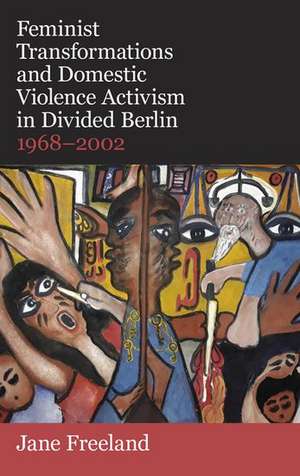Feminist Transformations and Domestic Violence Activism in Divided Berlin, 1968-2002: British Academy Monographs
Autor Jane Freelanden Limba Engleză Hardback – 10 noi 2022
Din seria British Academy Monographs
- 27%
 Preț: 411.05 lei
Preț: 411.05 lei - 27%
 Preț: 471.54 lei
Preț: 471.54 lei - 25%
 Preț: 124.89 lei
Preț: 124.89 lei - 27%
 Preț: 501.53 lei
Preț: 501.53 lei - 22%
 Preț: 188.18 lei
Preț: 188.18 lei - 19%
 Preț: 678.05 lei
Preț: 678.05 lei - 28%
 Preț: 433.04 lei
Preț: 433.04 lei - 19%
 Preț: 627.73 lei
Preț: 627.73 lei - 27%
 Preț: 347.43 lei
Preț: 347.43 lei - 30%
 Preț: 648.07 lei
Preț: 648.07 lei - 30%
 Preț: 652.70 lei
Preț: 652.70 lei - 19%
 Preț: 505.38 lei
Preț: 505.38 lei - 17%
 Preț: 543.30 lei
Preț: 543.30 lei - 30%
 Preț: 543.97 lei
Preț: 543.97 lei - 30%
 Preț: 541.61 lei
Preț: 541.61 lei - 30%
 Preț: 515.91 lei
Preț: 515.91 lei - 18%
 Preț: 321.69 lei
Preț: 321.69 lei - 30%
 Preț: 595.60 lei
Preț: 595.60 lei - 19%
 Preț: 574.20 lei
Preț: 574.20 lei - 28%
 Preț: 376.01 lei
Preț: 376.01 lei - 28%
 Preț: 438.17 lei
Preț: 438.17 lei - 27%
 Preț: 501.93 lei
Preț: 501.93 lei - 29%
 Preț: 520.79 lei
Preț: 520.79 lei - 28%
 Preț: 469.25 lei
Preț: 469.25 lei - 27%
 Preț: 346.13 lei
Preț: 346.13 lei - 30%
 Preț: 544.80 lei
Preț: 544.80 lei - 31%
 Preț: 346.67 lei
Preț: 346.67 lei - 28%
 Preț: 435.50 lei
Preț: 435.50 lei - 30%
 Preț: 602.11 lei
Preț: 602.11 lei
Preț: 468.15 lei
Preț vechi: 682.00 lei
-31% Nou
Puncte Express: 702
Preț estimativ în valută:
89.58€ • 93.53$ • 74.14£
89.58€ • 93.53$ • 74.14£
Carte tipărită la comandă
Livrare economică 24-31 martie
Preluare comenzi: 021 569.72.76
Specificații
ISBN-13: 9780197267110
ISBN-10: 0197267114
Pagini: 240
Ilustrații: 4 images, 1 table
Dimensiuni: 160 x 240 x 20 mm
Greutate: 0.53 kg
Editura: OUP OXFORD
Colecția OUP Oxford
Seria British Academy Monographs
Locul publicării:Oxford, United Kingdom
ISBN-10: 0197267114
Pagini: 240
Ilustrații: 4 images, 1 table
Dimensiuni: 160 x 240 x 20 mm
Greutate: 0.53 kg
Editura: OUP OXFORD
Colecția OUP Oxford
Seria British Academy Monographs
Locul publicării:Oxford, United Kingdom
Recenzii
For our own confused era of ongoing liberalization and ferocious antifeminism, Freeland's beautifully argued book offers myriad profound insights. Contrasting developments under democratic capitalism and state socialism, Freeland makes ingenious use of sources to consider anew the intricacy of interactions between activists and the people they serve - as well as the politicians and wider public they need to persuade - and the learning processes necessary to secure broad-based progressive social change.
Jane Freeland's original and pioneering book uses the campaign against domestic violence - first in West Germany, then in the GDR - as a revealing case study of the relationship between feminism and social politics in each rival republic, and puts it in a broader transnational context. In it she boldly explores how feminist politics were negotiated across national boundaries and the Cold War divide, and at the crossroads of political and social history, organised activism and private life, with surprising results.
Feminist Transformations and Domestic Violence Activism in Divided Berlin is an urgent intervention in both the history of postwar Germany, and the history of feminism. Jane Freeland is breaking new ground, both in her evaluation of the impact of feminism on the mainstream political agenda, and her nuanced assessment of how the movement was changed in the process. Her integration of activism in East Berlin, before and after the Wende, expands our understanding of feminism in exciting and important ways. We need more work like this!
Feminist Transformations deserves a wide readership among historians of divided and reunified Germany, as well as among scholars of feminism more broadly.
Freeland's monograph is an important addition to the canon of German gender history in many ways.
Jane Freeland has written an ambitious book about a field of the social history of the double Germany and the reunified Federal Republic that is still unfairly viewed as an addendum. It shows that the analysis of the interactions between, firstly, feminist activists, secondly, media representatives, thirdly, state actors and, fourthly, the addressees of the violence protection initiatives, sharpen and sometimes blind central questions of German history since the 1960s can illuminate the spot.
Jane Freeland's original and pioneering book uses the campaign against domestic violence - first in West Germany, then in the GDR - as a revealing case study of the relationship between feminism and social politics in each rival republic, and puts it in a broader transnational context. In it she boldly explores how feminist politics were negotiated across national boundaries and the Cold War divide, and at the crossroads of political and social history, organised activism and private life, with surprising results.
Feminist Transformations and Domestic Violence Activism in Divided Berlin is an urgent intervention in both the history of postwar Germany, and the history of feminism. Jane Freeland is breaking new ground, both in her evaluation of the impact of feminism on the mainstream political agenda, and her nuanced assessment of how the movement was changed in the process. Her integration of activism in East Berlin, before and after the Wende, expands our understanding of feminism in exciting and important ways. We need more work like this!
Feminist Transformations deserves a wide readership among historians of divided and reunified Germany, as well as among scholars of feminism more broadly.
Freeland's monograph is an important addition to the canon of German gender history in many ways.
Jane Freeland has written an ambitious book about a field of the social history of the double Germany and the reunified Federal Republic that is still unfairly viewed as an addendum. It shows that the analysis of the interactions between, firstly, feminist activists, secondly, media representatives, thirdly, state actors and, fourthly, the addressees of the violence protection initiatives, sharpen and sometimes blind central questions of German history since the 1960s can illuminate the spot.
Notă biografică
Jane Freeland is a Lecturer in History and Fellow at the Institute for the Humanities and Social Sciences at Queen Mary University of London. Her research examines the history of feminism in Germany and Europe in the twentieth century, with a particular focus on feminist activism against domestic violence and feminism and the media.
